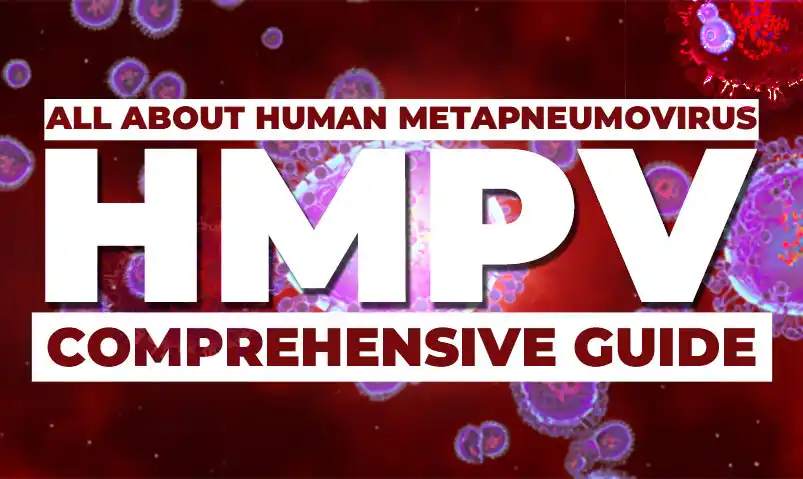All About Human Metapneumovirus (HMPV): Comprehensive Guide
Human Metapneumovirus (HMPV) is a respiratory virus that can cause illness in people of all ages. Although it shares symptoms with other respiratory infections, such as the common cold or influenza, HMPV can sometimes lead to more severe respiratory conditions, especially in vulnerable groups such as infants, the elderly, and individuals with weakened immune systems.
This comprehensive guide will explore everything you need to know about the Human Metapneumovirus (HMPV) virus, including its symptoms, causes, transmission, treatment, and prevention. For those seeking medical support, places like Criticare Lifeline Hospital offer expert care for managing respiratory infections and providing the best possible outcomes.
What is Human Metapneumovirus?
Human Metapneumovirus (HMPV) is a virus belonging to the paramyxovirus family. It was first identified in 2001, and since then, it has been recognized as an important cause of respiratory illnesses, particularly in young children, older adults, and those with compromised immune systems. The virus primarily affects the respiratory system, causing nose, throat, and lung infections.
Symptoms of HMPV
The symptoms of an HMPV infection can vary from mild to severe, depending on the individual’s age and overall health. Some of the common symptoms include:
- Cough (dry or productive)
- Fever (often mild)
- Runny or stuffy nose
- Sore throat
- Wheezing or difficulty breathing
- Fatigue and general malaise
- Shortness of breath (in more severe cases)
In more vulnerable populations, such as infants, elderly individuals, and those with pre-existing respiratory conditions like asthma or COPD, HMPV can lead to more severe complications, including pneumonia or bronchiolitis. Hospitalization may be necessary for these individuals to provide respiratory support and other medical interventions.
How is HMPV Transmitted?
HMPV primarily spreads through respiratory droplets when an infected person coughs, sneezes, or talks. It can also be transmitted by touching surfaces or objects contaminated with the virus and touching the face, eyes, or mouth.
The virus is most active during the fall, winter, and early spring months, making it a significant concern during colder seasons when respiratory infections tend to be more common.
Diagnosis and Testing
Diagnosing this virus can sometimes be challenging, as its symptoms closely resemble those of other respiratory infections, such as influenza or RSV (respiratory syncytial virus). Doctors may perform a physical exam and order specific tests, including a PCR (Polymerase Chain Reaction) test or a viral culture from respiratory samples, to confirm the presence of the Human Metapneumovirus (HMPV) virus.
If you or your loved ones are experiencing symptoms of HMPV infection, it’s crucial to seek medical attention. Healthcare facilities like Criticare Lifeline Hospital provide diagnostic services to ensure that the right virus is identified and treated accordingly.
Treatment for HMPV
Currently, there is no specific antiviral treatment for this infection. Management primarily focuses on alleviating symptoms and supporting the patient’s respiratory function. Treatment options may include:
- Rest and hydration to help the body recover.
- Over-the-counter medications like Dolo 650 or ibuprofen to manage fever and discomfort.
- Bronchodilators or steroids help open up airways and reduce inflammation.
- Oxygen therapy or ventilator support in severe cases where breathing becomes difficult.
In most cases, individuals with mild infections recover within one to two weeks. However, those with underlying health conditions may require more intensive care, including hospitalization, to ensure proper recovery.
Prevention of HMPV Infection
While there is no vaccine for the virus at this time, there are several effective ways to reduce the risk of infection. Preventive measures include:
- Good hand hygiene: Washing hands regularly with soap and water, especially after coughing or sneezing, can help prevent the spread of the virus.
- Avoid close contact: Stay away from individuals who are sick, particularly those showing symptoms of respiratory infections.
- Covering coughs and sneezes: Using a tissue or the inside of your elbow can help prevent the spread of respiratory droplets.
- Disinfecting surfaces: Regularly cleaning and disinfecting frequently touched surfaces, such as doorknobs, light switches, and phones, can help reduce the risk of transmission.
- Strengthening the immune system: Maintaining a healthy lifestyle with proper nutrition, exercise, and sufficient sleep can help bolster the body’s natural defenses against viruses.
Role of Criticare Lifeline Hospital in Managing HMPV
1. Advanced Diagnostic Tools: Equipped with state-of-the-art equipment to diagnose the virus and other respiratory infections accurately.
2. Comprehensive Medical Services:
- Pediatric care for children with infections.
- Geriatric care for elderly patients, a vulnerable group for respiratory infections.
- Respiratory therapy to support breathing and manage symptoms.
3. Expert Care for Respiratory Distress: A dedicated healthcare team provides the best care for individuals experiencing respiratory issues due to this virus.
4. Emotional Support for Families:
- Healthcare providers offer comfort and reassurance during a stressful time.
- Focus on educating families to ensure they understand the treatment process.
5. Patient-Centered Approach: Prioritizing patient comfort and well-being, ensuring both physical and emotional care during recovery.
6. Vigilant Monitoring: Regular assessments to ensure that patients are improving and receiving the necessary interventions to recover fully.
Conclusion
Human Metapneumovirus is an important respiratory virus that can cause serious illness in certain groups of people. While most people recover with supportive care, the virus can lead to complications in vulnerable individuals, making early diagnosis and treatment crucial. If you or a loved one is experiencing symptoms of this virus, don’t hesitate to seek medical help. Facilities like Criticare Lifeline Hospital offer the care and expertise needed to manage respiratory infections and provide relief to those in need.
By understanding the nature of the virus and taking steps to prevent infection, you can better protect yourself and your loved ones from the impact of this illness.
Stay informed, practice good hygiene, and seek timely medical attention if necessary; your health and well-being matter.


Leave a comment